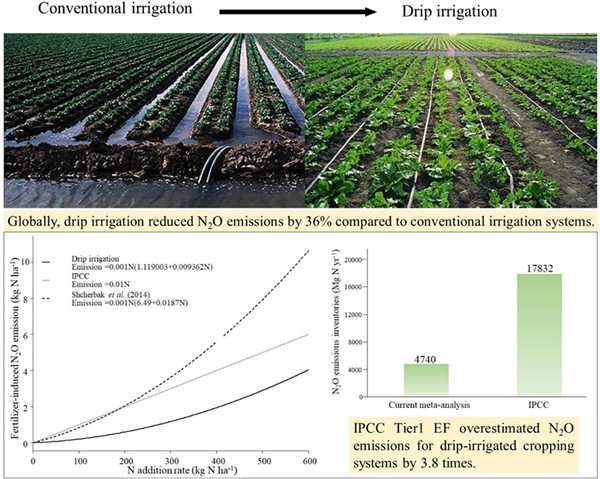Study: Drip Irrigation Should Be Recommended as Essential N2O Mitigation Strategy for Irrigated Crop Production
2021-05-10
An international team led by researchers from the Xinjiang Institute of Ecology and Geography of the Chinese Academy of Sciences, Beijing Forestry University, and the University of Manitoba has found that drip irrigation is an effective strategy to mitigate N2O emissions from croplands.
The findings were published in Global Change Biology on 30 April 2021, entitled "A global meta-analysis of nitrous oxide emission from drip irrigated cropping system".
Drip irrigation is a useful practice to enhance water and fertilizer nitrogen (N) use efficiency. However, the use of drip irrigation to mitigate nitrous oxide (N2O) emissions in agricultural systems globally is uncertain.
In this study, the researchers performed a global meta-analysis of 485 field measurements of N2O emissions from 74 peer-reviewed publications prior to March 2021, to quantify the fertilizer-induced N2O emission factor (EF) of drip irrigation and examine the influencing factors of climate, crop, soil properties, and source and rate of fertilizer N application.
Results showed that drip irrigation reduced (P<0.05) N2O emissions by 32% and 46% compared to furrow and sprinkler irrigation systems, respectively. The overall average EF with drip irrigation was 0.35%, being two-third lower than the IPCC Tier I default value of 1% (kg N2O-N/kg added fertilizer N). The EF was not significantly affected by climate, crop, soil texture, soil organic carbon content and pH. The EF was also not significantly (P>0.05) affected by synthetic N fertilizer source despite a lower numerical value with enhanced efficiency than conventional fertilizers. The EF increased significantly (P<0.001) with N addition rate in a binomial distribution. Compared to the IPCC default, N2O emissions inventories for drip-irrigated cropping systems are overestimated by 7,614 and 13,091 Mg per year for China and the globe, respectively. These results indicate that drip irrigation should be recommended as an essential N2O mitigation strategy for irrigated crop production.
The study was funded by the National Natural Science Foundation of China, China Postdoctoral Science Foundation and the Fundamental Research Funds for the Central Universities.
Article link: http://doi.org/10.1111/gcb.15636

Contact: LIU Jie, Xinjiang Institute of Ecology and Geography
E-mail: liujie@ms.xjb.ac.cn



